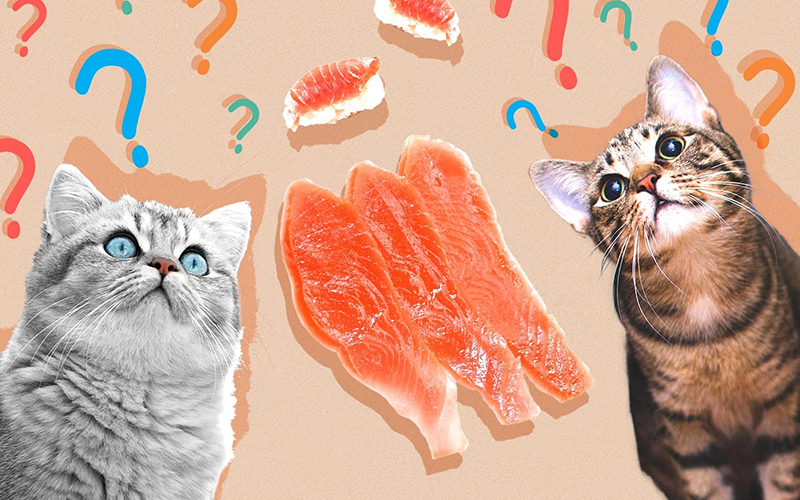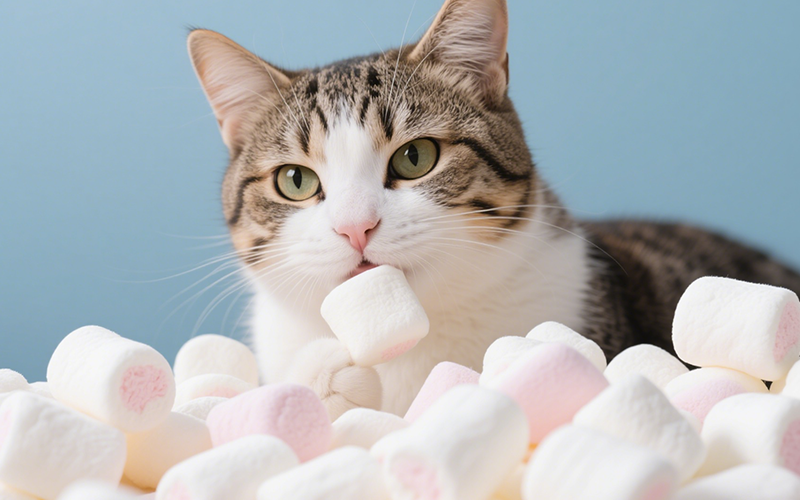Can Cats Eat Raw Salmon? A Guide for Pet Owners
- 27 Feb 2025 14:29
Salmon is a popular and nutritious fish that many people enjoy, and it’s often considered a healthy food for pets. However, when it comes to feeding raw salmon to your cat, there are a few important considerations and potential risks that pet owners should be aware of. While salmon is packed with protein and omega-3 fatty acids, raw fish can carry some health concerns for your feline friend.
In this article, we'll examine whether cats can safely eat raw salmon, the potential risks involved, and how to prepare it for your cat if you choose to include it in their diet.

Can Cats Eat Raw Salmon?
Short answer: No, cats should not eat raw salmon.
Although raw salmon may seem like a natural choice for your carnivorous cat, it’s important to understand that raw fish can pose serious health risks. While cats are obligate carnivores and their digestive systems are adapted to consuming raw meat in the wild, raw salmon (and other raw fish) can carry harmful bacteria and parasites that could cause illness. Let’s explore the risks and other factors to consider before feeding raw salmon to your cat.
Risks of Feeding Raw Salmon to Cats
Bacterial Contamination:Raw fish, including salmon, is susceptible to contamination with bacteria such as Salmonella and E. coli, which can lead to food poisoning in cats. These bacteria can cause symptoms like vomiting, diarrhea, abdominal pain, and fever. While cats have strong stomach acids and might be able to tolerate small amounts of bacterial exposure, the risk is still significant, especially for cats with weakened immune systems or young kittens.
Parasites:Raw salmon is known to carry parasites, such as tapeworms and flukes, which can cause health issues for your cat if ingested. For example, a parasite called Neorickettsia helminthoeca, found in raw fish, causes a condition known as salmon poisoning disease, which can be fatal to cats. Symptoms of this disease include vomiting, fever, and lethargy.
Thiamine Deficiency:Feeding raw salmon to your cat regularly can lead to thiamine deficiency. Salmon, like other raw fish, contains an enzyme called thiaminase, which can break down thiamine (vitamin B1) in your cat’s body. Thiamine is essential for nerve function, and a deficiency can cause serious neurological issues, including loss of appetite, seizures, and muscle weakness.
Unbalanced Diet:Raw salmon alone is not a complete meal for your cat. Cats need a balanced diet that includes protein, fat, vitamins, minerals, and taurine. Feeding them raw salmon as a regular part of their diet could lead to nutritional imbalances, even if it provides some beneficial nutrients like omega-3 fatty acids and protein.
Bones and Choking Hazard:While salmon is generally boneless, certain parts, like the tail, fins, and bones near the head, can present a choking hazard or cause digestive blockages. Ingesting sharp bones can also damage the throat or digestive tract.
Should You Ever Feed Raw Salmon to Cats?
Given the risks of feeding raw salmon, it is not recommended to offer it to your cat. However, there are safe alternatives for providing your cat with the nutritional benefits of salmon, including cooked salmon or commercially prepared raw diets that have been properly handled and balanced to meet your cat's nutritional needs.
If you still want to offer salmon to your cat, cooked salmon is a safer option. Cooking the salmon eliminates harmful bacteria, parasites, and thiaminase, making it safer for your cat to eat. It’s also essential to remove any bones before serving, as they can pose a choking hazard or cause internal injuries.
Benefits of Salmon for Cats
Despite the risks of raw salmon, there are several benefits to feeding cooked salmon to your cat in moderation:
High-Quality Protein:Salmon is an excellent source of high-quality protein, which is essential for muscle maintenance, growth, and overall health. Cats, being obligate carnivores, require a protein-rich diet to thrive.
Omega-3 Fatty Acids:Salmon is rich in omega-3 fatty acids, particularly EPA and DHA, which can help reduce inflammation, promote a healthy coat, and support heart and brain health. Omega-3s also play a role in boosting the immune system.
Vitamins and Minerals:Salmon is packed with important vitamins and minerals, such as vitamin D, vitamin B12, and selenium, which support overall health and well-being. These nutrients can help with the proper functioning of the immune system, skin health, and energy levels.
How to Safely Feed Salmon to Your Cat
If you decide to feed cooked salmon to your cat, follow these tips to ensure it’s done safely:
Cook Thoroughly:Make sure to cook the salmon fully. Baking, grilling, or steaming are good methods. Avoid using butter, oils, or seasonings, as these can be harmful to your cat. Salmon should be cooked plain and without any added flavorings or spices.
Remove the Skin and Bones:Remove the skin and bones from the salmon before offering it to your cat. Fish bones can pose a choking hazard and cause injury to your cat’s mouth or digestive tract.
Serve in Small Portions:Salmon should be offered in moderation. Too much fish, even cooked, can cause nutritional imbalances or digestive upset. A small portion once in a while is sufficient to provide the benefits of salmon without overdoing it.
Monitor for Allergic Reactions:Although rare, some cats may be allergic to fish. If you notice any signs of vomiting, diarrhea, or itchiness after feeding salmon to your cat, stop offering it and consult your veterinarian.
Conclusion: Can Cats Eat Raw Salmon?
In conclusion, cats should not eat raw salmon due to the risks of bacterial contamination, parasites, and nutritional imbalances. While raw salmon may seem like a natural choice for your cat, it’s safer to offer cooked salmon in moderation. Cooking the salmon eliminates harmful bacteria, parasites, and thiaminase, making it safer for your cat to enjoy. Always remove the skin and bones, and offer salmon as part of a balanced diet.
For more personalized advice or if you're ever unsure about your cat's diet, consider consulting PettureX, a friendly pet health software assistant. PettureX provides 24/7 online consultations, ensuring you're making safe and informed decisions about your pet's health and nutrition.
Related

Marshmallows and Cats: A Puffy Problem? Why Vets Say No to This Sugary Snack
- 22 Apr 2025
Kefir for Kitties? A Veterinarian-Reviewed Guide to Safety, Benefits & Risks
- 22 Apr 2025
The Burning Question: Can Cats Eat Jalapenos? A Comprehensive Safety Guide
- 21 Apr 2025
Cool Temptation: Can Cats Eat Ice Cream Safely? The Vet-Backed Truth
- 21 Apr 2025
Frankly Dangerous: Can Cats Eat Hot Dogs? Vet Explains the Serious Risks
- 16 Apr 2025
A Purrfect Protein? Can Cats Eat Ground Turkey Safely? (Vet-Reviewed Guide)
- 16 Apr 2025
Gritty Situation: Can Cats Eat Grits Safely? Vet Explains the Risks
- 16 Apr 2025
Gravy Danger Zone: Can Cats Eat Gravy Safely? (Vet-Reviewed Warning)
- 16 Apr 2025
Crunchy Query: Can Cats Eat Green Peppers? A Vet-Reviewed Safety Analysis
- 16 Apr 2025
Toxic Temptation: Can Cats Eat Grapefruit? Vet Explains the Dangers
- 16 Apr 2025
